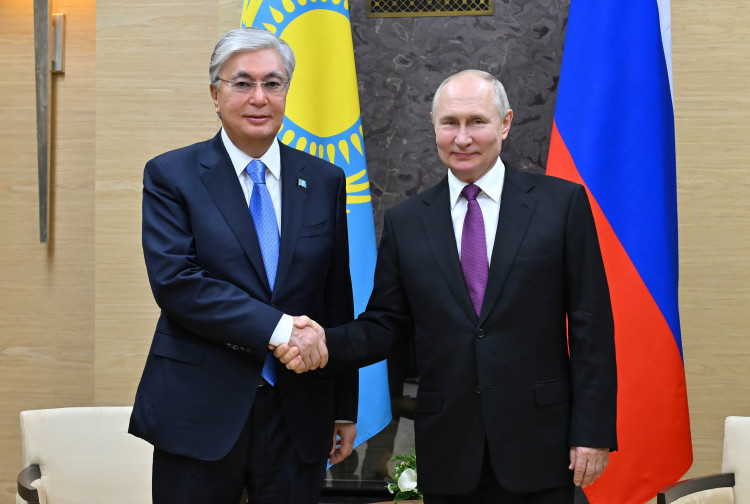BAKU, Azerbaijan, November 11. The state visit of Kazakhstan's President Kassym-Jomart Tokayev to Russia, scheduled for November 11-12, 2025, is set to be a game-changer in the evolution of bilateral relations. A key outcome of the visit is anticipated to be the signing of a declaration on transitioning Kazakhstan-Russia cooperation to the level of a comprehensive strategic partnership and alliance.
During the visit, President Tokayev will hold talks with Vladimir Putin and deliver a video address at the 21st Forum of Interregional Cooperation between Russia and Kazakhstan in Uralsk. Additionally, a series of bilateral agreements on trade, economy, energy, and infrastructure are planned to be signed.
One of the central areas of cooperation between the neighboring countries remains the development of transport and logistics links. The visit of Tokayev could significantly accelerate the development of transport infrastructure and logistics flows between the two countries. Kazakhstan, which hosts 13 international transport corridors, plays a crucial role in ensuring connectivity across Eurasia. The development of transit routes and infrastructure modernization are of strategic importance not only for Kazakhstan and Russia but for the entire region.
In recent months, Kazakhstan and Russia have intensified their work on the development of international transport corridors linking Europe, Russia, Central Asia, and the Middle East. At the 26th meeting of the Intergovernmental Commission in Astana, which took place a few days ago, the parties discussed increasing the volume of rail freight, including transit on the China-Europe-China route, as well as steps to develop the North-South international transport corridor.
An important milestone was the signing in July 2024 of a roadmap for the synchronized development of the eastern branch of the North-South route with the participation of Russia, Kazakhstan, Iran, and Turkmenistan. By the end of 2025, an agreement is expected to be reached between Kazakhstan and Russia to increase transport volumes along this route, with the capacity of the eastern corridor projected to reach 20 million tons per year by 2030.
The dynamics of transportation are also positive. According to Kazakhstan Railways, between January and October 2025, rail freight between Kazakhstan and Russia grew by five percent, reaching 71.6 million tons.
Even with a strong hand in glove, the countries are up against a few practical hurdles, mainly tied to border infrastructure and customs red tape.
Currently, there are 51 border crossing points between Kazakhstan and Russia, 30 of which are automobile crossings. Their throughput capacity is still a drop in the bucket, particularly with the flood of goods coming in.
Astana and Moscow have agreed to bring forward the reconstruction of border checkpoints to the 2026-2027 period (originally planned for after 2030). Work is already underway at the "Syrym," "Alimbet," and "Kosak" crossings in Kazakhstan, which will increase capacity, reduce waiting times, and simplify transport procedures.
On the flip side, as of January 1, 2025, new migration rules came into effect in Russia, reducing the period of stay for foreign nationals without registration from 180 to 90 days per year. This has caused difficulties for Kazakh transporters who regularly travel through Russia. The Kazakh side raised this issue at the Intergovernmental Commission meeting and secured agreement from Moscow to consider restoring the previous 180-day limit. Although a decision has not yet been formally made, Russia is ready to roll up its sleeves and loosen the reins for international carriers to keep the wheels of logistics turning smoothly.
There has also been an issue with delays at border crossings due to new EAEU product labeling requirements. Significant truck queues were observed at the border in September and October. To alleviate the situation, President Vladimir Putin signed a decree on October 24 temporarily simplifying customs procedures for Kazakhstan and Kyrgyzstan. Thus, until December 10, 2025, carriers will be able to import goods into Russia without the mandatory labeling confirming their origin within the Union. Russian companies, however, will still be required to register and declare the goods afterward.
Tokayev’s visit could significantly accelerate the development of transport infrastructure and the optimization of logistics flows between the countries. Already, the modernization of border checkpoints, the expansion of transport corridor capacity, and the simplification of procedures within the framework of the EAEU are providing a solid foundation for sustainable trade and transportation growth. It is expected that the new agreements signed during the visit will strengthen Russia and Kazakhstan's role in the transport and logistics system of Eurasia. These agreements will enhance cooperation in infrastructure and logistics, which, in turn, will improve the efficiency of transit and trade flows in the region.







